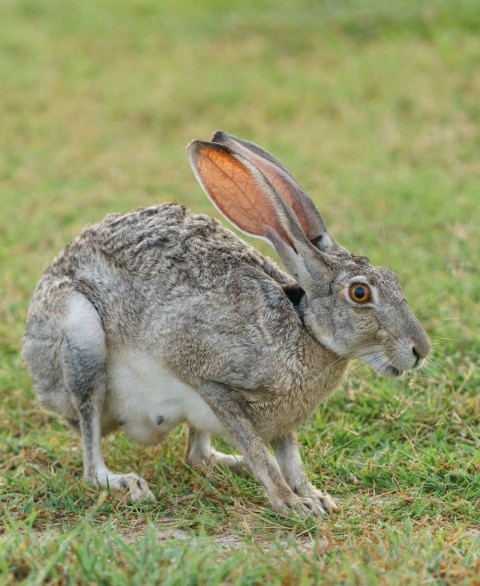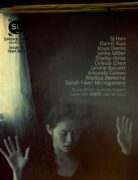The kids at school got under Sam’s skin—pointing at the scars lining her wrists like she didn’t know—so when she found the pelt, she donned it as her own.
Sometime she held the smooth blade of her father’s hunting knife, like when she couldn’t escape the sound of her heartbeat in her throat or there was nothing in the fridge again, her father sleeping off a football loss in the parking lot of the town bar in his old pickup, the bumper hanging on like Sam’s canine jutting crooked as a snarl, the one she ran her tongue across when she was nervous, which was most of the time, early mornings when she dressed for middle school or late at night when the wolves in the woods surrounding the town howled at their prey.
Sam used to pray—that her mother would come back from the next state over where she lived with her new family, that her teen body would grow so her vertebrae weren’t naked and exposed, that the taxidermized animals lining the walls of her house would stop staring at her from behind glass eyes and scarred hides as if they understood how it felt to be hunted. Praying never worked because she fell asleep before she finished, bargaining partway through that she would stop pulling out her hair to suck at the end of the strands if she could just be beautiful. Or her father would interrupt, falling in the hallway when he poured himself home or dragging his rifle along the floor before an early morning hunt for boar or wild turkeys.
“Why’d you lock the door?” he always demanded, his eyes glinting sharp, “Your mother might come back,” though they both knew she wouldn’t, that once people left, by car or crash, intention or accident, they never returned, were like a wolf wail up to the moon.
Now she hid—from the kids at school who called her trash, from her father asking to bum a few bucks from her earnings at the thrift store that smelled like mothballs but was the perfect place for a girl who felt discarded, from the feeling the woods were creeping closer towards their rural house where the power flickered too often like it wanted to leave and the forest shrieked each night as if to say survival was never guaranteed.
When she found the coat—rabbit she hoped, small but strong, capable of snapping a neck with a thrash, though it was likely something cheaper—she paid the store manager $3.00, put it on, and never took it off.
It felt safe, warm and oversized like she could grow beyond what people expected of her, maybe get the choir solo if she could unlock her jaw and let the howl out of her mouth or run away from this town where the mosquitoes were so thick they stuck to her legs and clouded her vision. She liked the way the coat smelled, like musk and sweat, metallic, she sometimes imagined, like a bit of blood around her gums when her father made ribs and they cracked open bones to suck at the sweet marrow.
She liked how the coat covered her scars, obscured her from sight, for even when the kids at school shouted, “No wonder your mom left,” she couldn’t see them, the hood pulled over her head. All the world was framed by fur and feral.
She began to delight in the way people recoiled from her, as if she were dangerous, as if she were about to lunge. The coat began to smell like her hair and skin, could not be penetrated by the smell of her father’s cigarette smoke or the bug spray the school used to keep the ticks away. She felt safer in her hide, started sleeping in it, stopped showering or shaving, which felt good because then the razor did not beckon her pale arms. Cushioned, she stopped feeling the old pains like when her father called her mother drunk to leave gulping pleas to come back on her voicemail, or the boys at school threw rocks and called her “wolf girl” with their straight white smiles.
“Nice pelt,” her father said one morning as he doused himself in pig piss and darkened his eyes and hands to camouflage himself with the deep woods. His tried not to freeze at the sight of Sam without pajamas, for she had taken lately to wearing the coat as if it were a dress or her own skin, for she preferred the feel of the fur against her flesh.
He worried she was restless like her mother as he squatted in the spruce and white pine, the berry bramble catching at his heel, the sound of branches breaking beneath his feet, his finger on the trigger of his lonely sorrow. Maybe, he hoped, he’d bring home a hide, hang it on the wall like a reminder they were not alone, could capture whatever they wanted. But he never caught much, a sickly hog giving up on itself or a turkey with a wattle hanging like regret from its throat.
Wandering back by moonlight, he wrang his empty hands, sucked at the blood on his wrist where thistle caught him quick, the sharp sting and seep.
The door was unlocked and ajar, like a wound or a crooked mouth. The house was empty, the lights ablaze, as if she had invited the darkness of the woods right in to stay.



 The core workshop of SmokeLong Fitness is all in writing, so you can take part from anywhere at anytime. We are excited about creating a supportive, consistent and structured environment for flash writers to work on their craft in a community. We are thrilled and proud to say that our workshop participants have won, placed, or been listed in every major flash competition. Community works.
The core workshop of SmokeLong Fitness is all in writing, so you can take part from anywhere at anytime. We are excited about creating a supportive, consistent and structured environment for flash writers to work on their craft in a community. We are thrilled and proud to say that our workshop participants have won, placed, or been listed in every major flash competition. Community works.